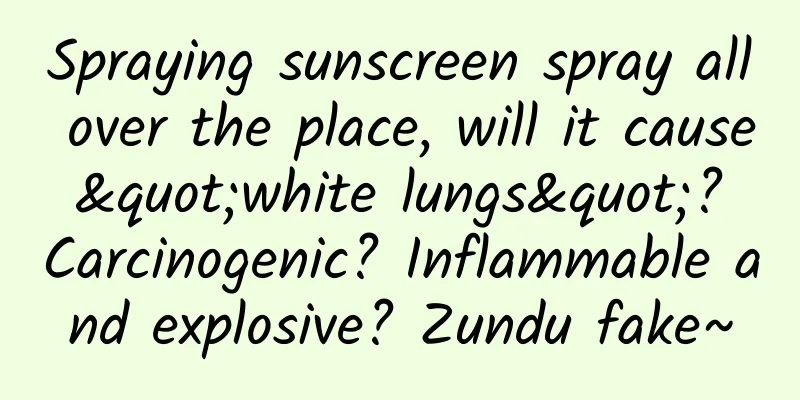Spraying sunscreen spray all over the place, will it cause "white lungs"? Carcinogenic? Inflammable and explosive? Zundu fake~

|
Spraying sunscreen all over the body before going out has become a basic practice for young people. After all, sunscreen spray is efficient and easy to use, and it does not feel greasy, so it is naturally favored by many people. However, there are rumors on the Internet that "sunscreen spray causes 'white lungs'", "sunscreen spray causes cancer", and "sunscreen spray turns into a flamethrower in seconds", which are simply shocking. So are these true or false? Let's find out. 01 Does sunscreen spray cause “white lung”? There have been reports of "white lungs" appearing in CT scans due to misuse of sunscreen spray. As we all know, the horrifying "white lungs" generally appear in patients with severe lung inflammation, that is, bilateral lung lesions reach more than 75%, and appear as large white areas in the lungs in imaging, so it is called "white lungs". This kind of "white lungs" often indicates severe pneumonia, and even life-threatening, so everyone is also terrified of "white lungs". So, can the use of sunscreen spray really cause such severe pneumonia? Image source: Pixabay In fact, this "white lung" is not the same as that "white lung". The reason for the "white lung" here is mainly caused by inhaling a large amount of spray, which is a relatively special case. Generally speaking, the "white lung" caused by sunscreen spray is mostly "allergic pneumonia" rather than "aspiration pneumonia" in the general sense. Allergic reactions are more related to the individual's immune status than to the amount of spray inhaled. Patients may experience clinical symptoms such as fever, cough, sputum, and cyanosis. Mild symptoms can improve within a few hours, while severe ones require hospitalization and generally have a good prognosis. So if you are not allergic, is it safe to use sunscreen spray? In principle, yes, but it also depends on whether the specific ingredients of the sunscreen spray are harmful to the human body, and whether long-term and large-scale exposure to these substances will have a certain impact on the body. Even if the chemical ingredients are not toxic to humans, they may irritate the respiratory tract and cause dry and itchy throats. People who are sensitive may also have symptoms such as coughing and expectoration. Therefore, avoid inhalation when using sunscreen spray. Don't think that you can just hold your breath when spraying. When you spray, there are high concentrations of chemicals in the surrounding environment, and you will eventually inhale them into your lungs. 02 Does sunscreen spray cause cancer? When it comes to whether the ingredients in sunscreen spray are harmful to the human body, it reminds people of the incident in which the U.S. Food and Drug Administration (FDA) recalled sunscreen products with excessive benzene content. Benzene is a carcinogen and there is no safe dose. Even long-term exposure to low concentrations of benzene may induce serious consequences such as leukemia, myeloma, and recurrent miscarriage. The National Institute for Occupational Safety and Health (NIOSH) defines benzene as a carcinogen and lists "inhalation, skin absorption, ingestion, skin and/or eye contact" as exposure routes. The FDA has clearly stated that benzene should not be used in standard drug production at all because it is unacceptably toxic, and even 0.1 ppm of benzene in sunscreen may expose people to cancer risks. The main function of sunscreen spray is to prevent ultraviolet (UV) damage to the skin, so it usually contains UV absorbers or filters, such as oxybenzone, benzophenone-3, avobenzone, ethylhexyl methoxycinnamate (Octinoxate), titanium dioxide and zinc oxide. From these main ingredients, there is no clear evidence that these ingredients have a carcinogenic risk. However, in 2020, titanium dioxide was certified by the European Union as a Class II suspected carcinogen posing a source of inhalation risk. However, the US FAD allows the use of titanium dioxide in sunscreen cosmetics, but only regulates its concentration: the maximum concentration shall not exceed 25%. Currently, most regulatory agencies, including the U.S. Food and Drug Administration (FDA) and the European Medicines Agency (EMA), consider sunscreen sprays to be safe under normal use, but recommend that inhalation of the spray be avoided as much as possible. In addition, some sprays add petroleum extracts as propellants during production, mainly because of their low boiling point and uniform misting effect, which will quickly vaporize after contact with the human body. However, if petroleum extracts are not fully purified during production, carcinogens may remain, and long-term high-dose exposure will definitely pose a health risk. 03 Is sunscreen spray flammable and explosive? Yes, you heard it right, most of the sunscreen sprays on the market are flammable and explosive. First, most sunscreen sprays use alcohol as a solvent, which is a flammable substance and will ignite immediately when it encounters a fire source. Second, some sunscreen sprays use liquefied petroleum gas as a propellant, which is a mixture of propane and butane and is highly flammable. If the sunscreen spray is used at high temperatures or near open flames, there is a risk of ignition, so when using sunscreen spray, be sure to avoid fire sources. In addition, due to its aerosol nature and portability, sunscreen spray is usually stored in aluminum cans and the container is a compressed gas cylinder. Generally, it does not pose a danger. However, under extreme conditions, such as the accumulation of a large amount of flammable gas in a closed space and encountering an ignition source, it is possible to explode. Image source: Pixabay Therefore, when using sunscreen spray, we must pay attention to the surrounding environment and make sure to keep away from flames, lit cigarettes or other heat sources that may cause fire. Do not store sunscreen spray in places with high temperatures or direct sunlight, such as not leaving it in a car exposed to the sun to prevent the can from exploding due to heat. If you are in a high-temperature environment outdoors for a long time or use it while camping, it is recommended to use sunscreen cream or gel instead. Generally speaking, the ingredients of sunscreen spray products that have passed the inspection are safe, but you should avoid inhalation during use and do not spray it on your face. You can spray it on your arms, back of the neck, legs and other parts of the body in a well-ventilated place. Keep away from fire when using it. If the ambient temperature is too high, it is recommended to use other sunscreen products such as sunscreen instead. Source: Chongqing Science and Technology Museum Author: He Wenting, Chongqing Children's Hospital Audit expert: Li Chunli Statement: Except for original content and special notes, some pictures are from the Internet. They are not for commercial purposes and are only used as popular science materials. The copyright belongs to the original authors. If there is any infringement, please contact us to delete them. |
Recommend
Google launches Android WebView Media Integrity API to improve the "security" of embedded video and audio content in apps
On November 6, in May this year, Google announced...
Did a main-belt comet collide with the source of life?
Where does the water on Earth come from? Recently...
Xiaopeng has trained hundreds of engineers for Volkswagen. Be careful not to teach the apprentices and starve the master to death
Volkswagen + Xiaopeng equals Dapeng! This is a jo...
The latest data from Tencent QQ: Internet interest report of post-95s!
Since those born after 1995 began to become the t...
Where is the way out for self-media in 2017?
Many operators now have a feeling: the number of ...
Aion's "Pure Electric Tyrannosaurus Rex" will soon debut at the Beijing Auto Show
On April 23, the "dot projection" of th...
Apple releases iOS 15.5 official version: smoother, supports third-party payment for some apps
In the early morning of May 17th, Beijing time, A...
360 application market promotion PC advertising display style!
【PC-Recommendation Page】 【PC-Software Page】 【PC-S...
The principles and applications of iOS compilation process
Preface Programming languages can generally be ...
Mobile IM development: technology selection and common problems
[[134897]] I am currently working on an iOS IM SD...
Ice does not conduct electricity? Did you notice the physics knowledge in Nezha 2?
Review expert: Zhou Hongzhi, senior laboratory te...
Trash! Why is the usage rate so low every time a coupon is issued?
Coupons are widely used, from offline stores to o...
Sweating profusely one second and generating electricity the next, what turns the human body into a generator?
The recent hot weather is really hot. As soon as ...
8 minutes to charge 1000 kilometers: GAC, a billionaire giant, hits the daily limit, and an academician angrily denounces it as "must be a liar"
In the past two days, a piece of news about GAC N...
Pinduoduo’s bargaining logic and strategic marketing methods!
Many people often receive price-cutting links fro...









